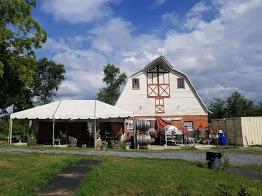
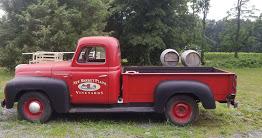 In 1793 the town of New Market was founded by Nicholas Hall Sr. and William Plummer as a rest and trade stop along the Baltimore Turnpike wagon trail. The two gentlemen understood the commercial value of the turnpike and turned a half-mile section of the trail into New Market’s Main Street. In twenty years the town had grown into an important trade center for wagoners and other travelers and included "a button factory, nail factory, wheelwright shops, blacksmith shops, tanneries, dry gods, grocery stores, inns, taverns, livery stables, wagon stands, " and most importantly -- distilleries. In 1818:
In 1793 the town of New Market was founded by Nicholas Hall Sr. and William Plummer as a rest and trade stop along the Baltimore Turnpike wagon trail. The two gentlemen understood the commercial value of the turnpike and turned a half-mile section of the trail into New Market’s Main Street. In twenty years the town had grown into an important trade center for wagoners and other travelers and included "a button factory, nail factory, wheelwright shops, blacksmith shops, tanneries, dry gods, grocery stores, inns, taverns, livery stables, wagon stands, " and most importantly -- distilleries. In 1818: ..the Baltimore Turnpike became the eastern section of the National Turnpike, one of the most famous and well-traveled highways in America. The Town of New Market became an integral part of the western trade route and the multitudes who opened America’s new frontiers passed through the center of town. The first stagecoaches carrying mail traveled Main Street. Over the road came heavy freight and Conestoga wagons loaded with grain, whiskey, tobacco, lumber, iron, furs, and other products. Passenger coaches and fancy buggies stopped at the hotels, inns, and taverns. Herds of cattle, sheep, and pigs were driven through to market. Peddlers came with carts and many traveled on foot carrying all they owned on their backs. (Town of New Market)
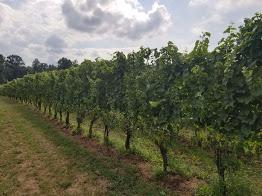
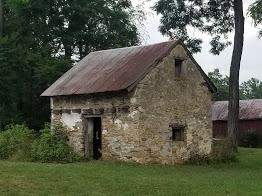
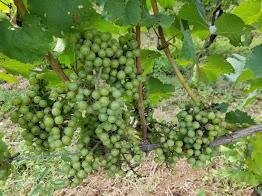 Eventually, the railroad and the automobile would reduce the trade and rest stop significance of New Market -- but not its historical significance. And on December 6, 1975, the Town of New Market was placed on the National Register of Historical Places and under the supervision of the Department of the Interior.
Eventually, the railroad and the automobile would reduce the trade and rest stop significance of New Market -- but not its historical significance. And on December 6, 1975, the Town of New Market was placed on the National Register of Historical Places and under the supervision of the Department of the Interior.At the same time, Susan Wilson, a direct descendent of Nicholas Hall Sr., was raised on the family dairy farm -- the same farm that lost a slice of land in 1792 in order to develop the town. "Many of the old outbuildings remain intact or restored, including a stone dairy/ice house, log smokehouse with a slate roof, log chicken house, log wagon shed and stable, frame general store/tenant house, early 1900's bank barn, and a tile dairy barn (now the winery) built-in 1941" (New Market Plains Vineyards).
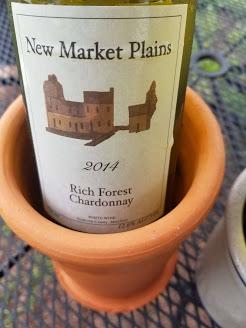 When she and her husband Howard inherited the property they drained their 401K accounts and planted Cabernet Franc, Cabernet Sauvignon, Chardonnay, Merlot, Muscat Blanc, Petit Verdot, and Syrah vines in 2012. Their first harvest occurred two years later and the estate was christened New Market Plains Vineyards.
When she and her husband Howard inherited the property they drained their 401K accounts and planted Cabernet Franc, Cabernet Sauvignon, Chardonnay, Merlot, Muscat Blanc, Petit Verdot, and Syrah vines in 2012. Their first harvest occurred two years later and the estate was christened New Market Plains Vineyards.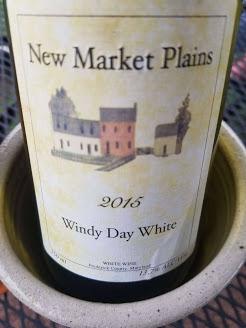
Recently we were able to enjoy the fruits of this original harvest in the 2014 Rich Forest Chardonnay ($20). This wine is made in the Burgundian style starting with barrel fermenting and finishing in oak. This wine shows why the winery is becoming state renowned for its Chardonnay as it is balanced between oak and juice with creamy lemons and fresh acids. Our group also finished a bottle of the 2015 Windy Day White ($23), a blend of Muscat Blanc and Chardonnay that is aged in stainless steel. The strong floral aroma is readily evident followed by tropical and citrus characters with the fresh acids alleviating the slight 0.7% sugar. We are looking forward to our next visit. Cheers.
